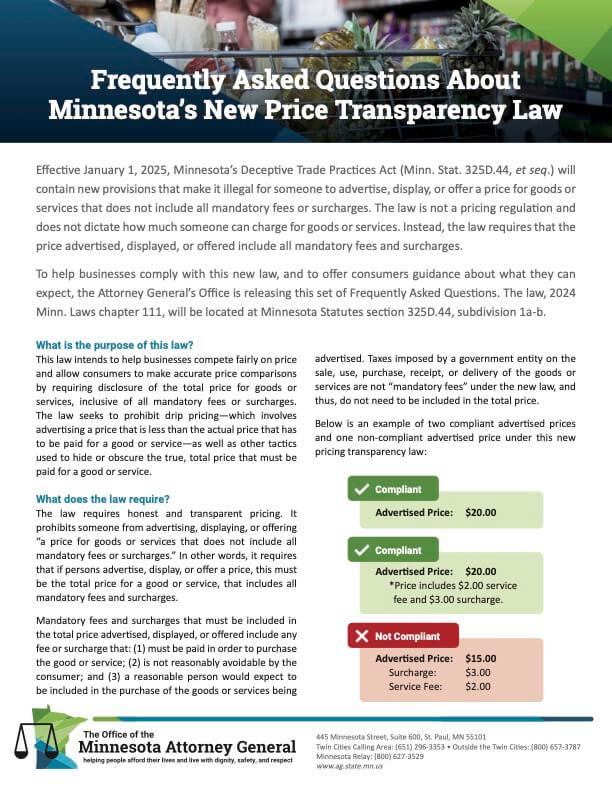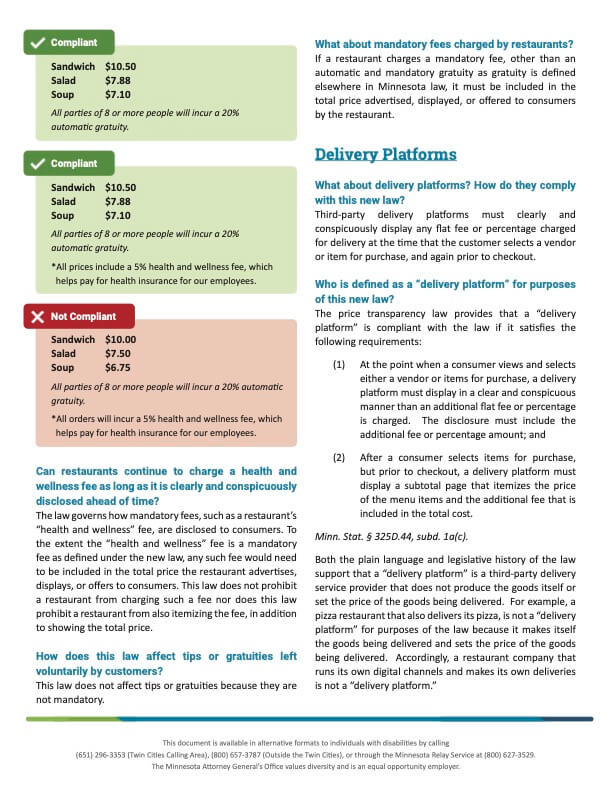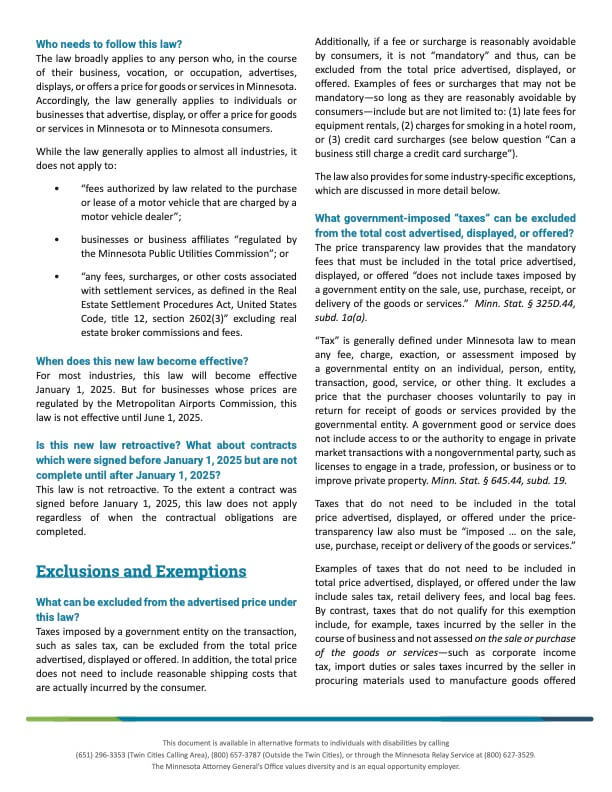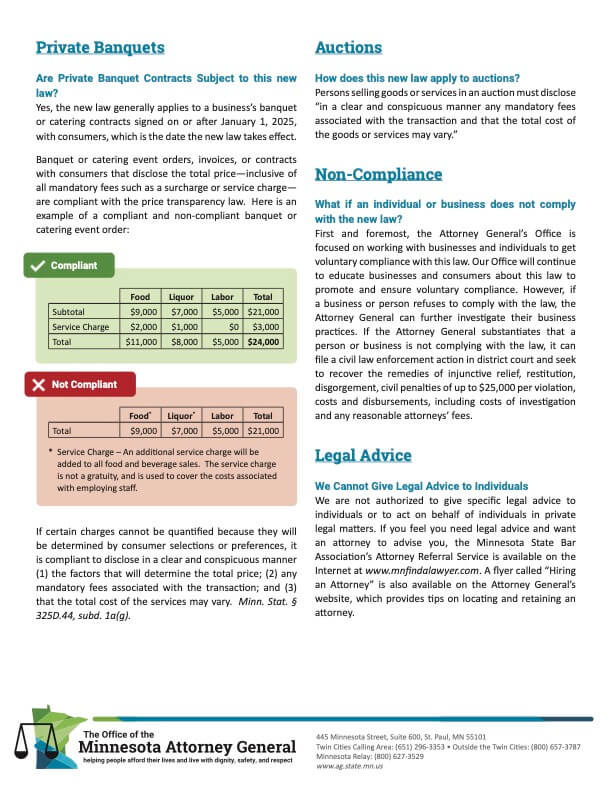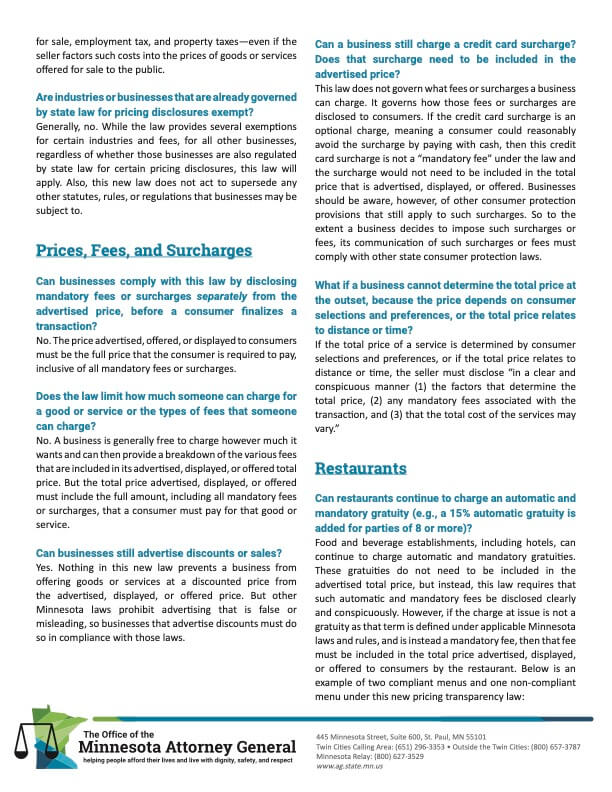New Price Transparency Law Takes Effect January 1, 2025
The Minnesota Attorney General's Office has released new guidelines for businesses to ensure compliance with the state's new price transparency law, which will take effect on January 1, 2025.
Key takeaways for businesses:
- The advertised price must be the total price, including all mandatory fees and surcharges. This means that the advertised price must be the price that the consumer will actually pay, including any fees or surcharges that are required to be paid to purchase the good or service.
- Businesses cannot advertise a price that is less than the actual price that must be paid for a good or service.
- The law applies to all businesses that advertise, display, or offer a price for goods or services in Minnesota. This includes both businesses that are located in Minnesota and businesses that sell goods or services to Minnesota consumers.
What is excluded from the advertised price?
- Taxes imposed by a government entity on the transaction. This includes sales tax, retail delivery fees, and local bag fees.
- Reasonable shipping costs that are actually incurred by the consumer.
- Fees that are reasonably avoidable by consumers. This includes credit card surcharges and delivery fees if consumers could reasonably avoid the surcharge by paying with cash or another method or picking up the goods in person.
Who does not need to follow this law?
- Businesses that are regulated by the Minnesota Public Utilities Commission.
- Businesses that are authorized by law to sell motor vehicles.
- Businesses that provide settlement services as defined in the Real Estate Settlement Procedures Act.
When does this new law become effective?
For most industries, this law will become effective on January 1, 2025. For businesses whose prices are regulated by the Metropolitan Airports Commission, this law is not effective until June 1, 2025.
Is this new law retroactive?
Additional information:
- Businesses can still charge fees and surcharges, but they must be disclosed clearly and conspicuously. This includes automatic and mandatory gratuities for parties of 8 or more.
- Restaurants can continue to charge mandatory fees, such as a health and wellness fee, as long as they are clearly and conspicuously disclosed ahead of time. The law requires that the total price advertised, displayed, or offered to consumers must include all mandatory fees. This does not prohibit a restaurant from also itemizing the fee in addition to showing the total price, as shown here:
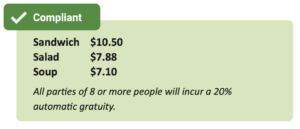
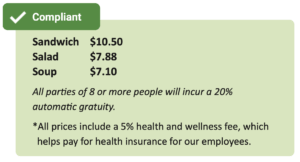
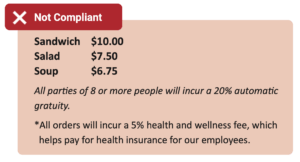
- Businesses can still advertise discounts and sales. However, any such advertising must be truthful and not misleading.
- Delivery platforms must clearly and conspicuously display any flat fee or percentage charged for delivery at the time that the customer selects a vendor or item for purchase, and again prior to checkout.
- Delivery platforms are defined as third-party delivery service providers that do not produce the goods themselves or set the price of the goods being delivered. For example, a pizza restaurant that also delivers its own pizza is not a delivery platform for purposes of the law because it makes itself the goods being delivered and sets the price of the goods being delivered. Accordingly, a restaurant company that runs its own digital channels and makes its own deliveries is not a "delivery platform."
- This law does not affect tips or gratuities left voluntarily by customers because they are not mandatory.
- The law also applies to auctions. Persons selling goods or services in an auction must disclose in a clear and conspicuous manner any mandatory fees associated with the transaction and that the total cost of the goods or services may vary.
Non-Compliance
Legal Advice
We cannot give legal advice to individuals. If you feel you need legal advice and want an attorney to act on behalf of you in private legal matters, the Minnesota State Bar Association's Attorney Referral Service is available on the Internet at www.mnfindalawyer.com [invalid 1 URL removed]. A flyer called "Hiring an Attorney" is also available on the Attorney General's website, which provides tips on locating and retaining an attorney.
For More Information
Click here for the Attorney General's complete Price Transparency FAQ's document. You can also refer to each page of the document below.

